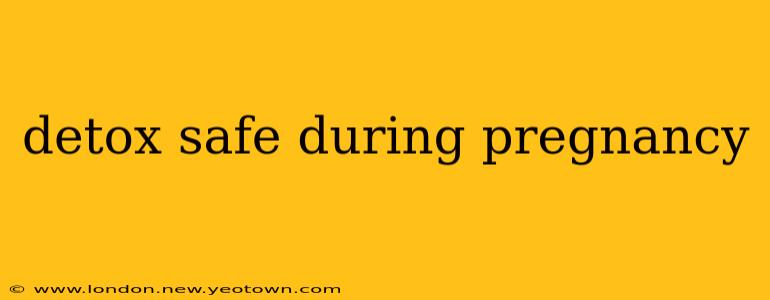Pregnancy is a miraculous journey, a time of profound transformation for both mother and child. But with this incredible change comes a natural concern: how to maintain optimal health and well-being, especially when it comes to practices like detoxification. The question "Is detox safe during pregnancy?" is one many expectant mothers grapple with, and the answer is nuanced. The short answer is: avoid any rigorous detox programs during pregnancy. Your body is already working incredibly hard to support the growing fetus, and forcing a detoxification process can be harmful. Instead, focus on gentle, holistic methods that support your body’s natural detoxification processes.
Let's explore this further, addressing some common questions and concerns.
Is it safe to detox during pregnancy?
No, aggressive detox programs, such as juice cleanses, fasting, or using over-the-counter detox teas, are generally not recommended during pregnancy. These methods can severely restrict nutrient intake, which is crucial for both maternal and fetal health. They can also lead to dehydration, electrolyte imbalances, and other potentially harmful complications. Your body's natural detoxification systems – the liver and kidneys – are already working diligently, and forcing them with harsh methods can disrupt their delicate balance.
What are the safest ways to detox during pregnancy?
Instead of intense detoxification methods, consider these gentler, safer approaches that support your body's natural processes:
-
Hydration: Drinking plenty of water is paramount. Water helps flush out toxins naturally and supports kidney function. Aim for at least eight glasses a day.
-
Nutrient-Rich Diet: Focus on consuming a balanced diet packed with fruits, vegetables, whole grains, and lean protein. These foods provide the essential vitamins and minerals needed to support both you and your baby. Avoid processed foods, excessive sugar, and unhealthy fats.
-
Gentle Exercise: Regular, moderate exercise, such as walking or prenatal yoga, can improve circulation and lymphatic drainage, assisting the body’s natural detoxification processes. Always consult your doctor before starting any new exercise regimen.
-
Adequate Sleep: Prioritizing sleep allows your body to repair and rejuvenate, crucial for detoxification.
-
Stress Management: Stress can negatively impact your immune system and overall health. Practicing relaxation techniques like deep breathing, meditation, or prenatal massage can help manage stress and support your body's ability to detoxify effectively.
What are the risks of detoxing during pregnancy?
The risks associated with aggressive detoxification during pregnancy are significant and can include:
- Nutrient Deficiencies: Restrictive diets can lead to deficiencies in essential vitamins and minerals, impacting fetal development.
- Dehydration: This can lead to complications for both mother and baby.
- Electrolyte Imbalances: These can cause muscle cramps, weakness, and even heart rhythm disturbances.
- Low Blood Sugar: Fasting or severely restricting calories can cause dangerously low blood sugar levels.
- Medication Interactions: Some detox products can interact negatively with prescription medications.
Are there any specific toxins I should avoid during pregnancy?
While completely avoiding all toxins is impossible, minimizing exposure is key. This means:
- Limit Exposure to Environmental Toxins: Be mindful of cleaning products, pesticides, and air pollutants. Choose eco-friendly alternatives whenever possible.
- Avoid Alcohol and Smoking: These are particularly harmful to both mother and baby.
- Limit Caffeine Intake: Excessive caffeine can increase the risk of miscarriage and low birth weight.
- Avoid Processed Foods and Artificial Sweeteners: These contain ingredients that can potentially interfere with your body’s natural detoxification processes.
How can I support my liver and kidneys during pregnancy?
Supporting your liver and kidneys is crucial for natural detoxification. This can be achieved through a healthy diet, hydration, and regular exercise. Additionally, consider incorporating foods known to support liver health, such as cruciferous vegetables (broccoli, cauliflower, kale), and foods rich in antioxidants.
What should I do if I'm concerned about toxins in my body during pregnancy?
If you have specific concerns about toxin exposure or your body's ability to detoxify, it's crucial to consult with your doctor or a qualified healthcare professional. They can assess your individual situation and provide personalized advice based on your health history and current pregnancy. Remember, a healthy pregnancy is all about supporting your body's natural wisdom and focusing on nourishing yourself and your baby. Don't rely on quick fixes; instead, focus on building healthy habits that will benefit you for the long term.

